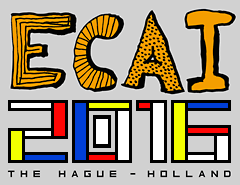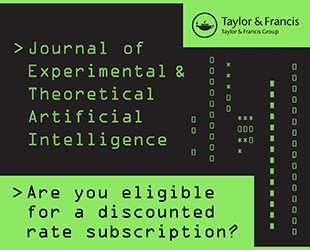
Autonomous Agents and Game Theory
Speaker: Jeff Rosenschein
The School of Engineering and Computer Science
The Hebrew University of Jerusalem, Israel
Wednesday, 09:00 – 10:00
Abstract
Game theory provides a solid theoretical foundation for the building of autonomous agents, but only when used appropriately. In this talk I will present three pieces of recent work, all of which are “game-theoretic” in flavor, but each of which takes a different approach to the use of that theory:
- Truth-bias as a technique to improve the match between Nash Equlibria and other solution criteria;
- Iterative Voting and the use of equilibria as a stability criterion for a dynamic process;
- Local Dominance, and the recasting of rationality criteria.
Along with descriptions of this research, I will discuss my evolving view of game theory and its relation to the building of autonomous systems.
This is joint work with Omer Lev, Kevin Leyton-Brown, Evangelos Markakis, Reshef Meir, Svetlana Obraztsov, David Parkes, Maria Polukarov, Zinovi Rabinovich, and David R. M. Thompson.
Bio (click to show)

The School of Engineering and Computer Science
The Hebrew University of Jerusalem, Israel
Wednesday, 09:00 – 10:00
Jeff Rosenschein is the Samuel and Will Strauss Professor of Computer Science in the School of Engineering and Computer Science at the Hebrew University of Jerusalem; he is director of its Multiagent Systems Research Group, and served as Head of the School from 2011 to 2014. He received his undergraduate degree in Applied Mathematics from Harvard University (1979), and his masters degree (1982) and PhD (1986) in Computer Science from Stanford University. He has published widely in the field of Multiagent Systems, including co-authoring the book “Rules of Encounter”, MIT Press, 1994, which influenced the adoption of game-theoretic techniques within the field of artificial intelligence. He is a Fellow of the Association for the Advancement of Artificial Intelligence, an incoming Fellow of the European Association for Artificial Intelligence, and was the 2013 recipient of the ACM/SIGART Autonomous Agents Research Award. He was co-editor-in-chief of the Journal of Autonomous Agents and Multiagent Systems from 2008 to 2014. He will be serving as the General Conference Chair of the combined 27th International Joint Conference on Artificial Intelligence and 23rd European Conference on Artificial Intelligence (IJCAI/ECAI 2018), to be held in Stockholm, Sweden.

Acting and Thinking Together
Speaker: Michael Bratman
University of Stanford
Thursday, 09:00 – 10:15
Abstract
We have an important capacity to act together, a capacity for shared intentional activity. Such shared activities are important in our lives, both instrumentally and intrinsically. A theory of human thought and action needs to be, in part, a theory of human thinking and acting together. Shared intentional activity of the sort of interest here is not merely strategic interaction; but it also need not be embedded in a framework of promises or the like.
My initial focus is on small-scale cases of shared intentional activity that need not be embedded in a larger institution and that do not involve asymmetric authority relations. I focus on duets rather than orchestras with conductors. I argue that if we begin with the planning theory of individual
agency I sketched in Intention, Plans, and Practical Reason (1987), we can construct a model of robust forms of shared agency, a model that is broadly continuous – conceptually, metaphysically, and normatively – with resources already present in our theory of individual planning agency. Our capacity for individual planning agency and related forms of individual cross-temporal organization is also at the bottom of our capacity for robust forms of sociality.
In this lecture I develop and defend this approach, drawing on my recent book Shared Agency: A Planning Theory of Acting Together (2014). I discuss how this approach helps us understand important forms of shared deliberation in which we think together. I go on to consider kinds of group intention that may seem to fall outside this framework. And I consider some recent, important challenges to this plan-theoretic approach.
Bio (click to show)

University of Stanford
Thursday, 09:00 – 10:15
agency I sketched in Intention, Plans, and Practical Reason (1987), we can construct a model of robust forms of shared agency, a model that is broadly continuous – conceptually, metaphysically, and normatively – with resources already present in our theory of individual planning agency. Our capacity for individual planning agency and related forms of individual cross-temporal organization is also at the bottom of our capacity for robust forms of sociality.
Michael E. Bratman has been at Stanford University since 1974. He is currently U.G. and Abbie Birch Durfee Professor in the School of Humanities and Sciences, and Professor of Philosophy at Stanford University. His book publications are Intention, Plans, and Practical Reason (1987), Faces of Intention: Selected Essays on Intention and Agency (1999), Structures of Agency: Essays (2007), and Shared Agency: A Planning Theory of Acting Together (2014). His joint paper with David Israel and Martha Pollock — “Plans and Resource-Bounded Practical Reasoning,” Computational Intelligence 4 (1988): 349-355 — was a winner of the 2008 IFAAMAS (International Foundation of Autonomous Agents and Multi-Agent Systems) influential paper award. He has been awarded an ACLS Fellowship, a Guggenheim Fellowship, and fellowships from the Center for Advanced Study in the Behavioral Sciences, and the Stanford University Humanities Center. He is a member of the American Academy of Arts and Sciences. He has been President of the Pacific Division of the American Philosophical Association, and was Chair of the National Board of the American Philosophical Association from 2011-2014. In 2014 he received the American Philosophical Association’s Philip L. Quinn Prize “in recognition of service to philosophy and philosophers, broadly construed.”

On the current state of vision in robotics
Speaker: Michael Zillich
Technical University of Vienna
Thursday, 13:30 – 14:30
Abstract
Computer vision has come a long way since its beginnings. In this talk I want to review some of the recent successes, which seem to indicate that many aspects of vision have indeed been solved and that the way should now be paved for robotic systems that can operate freely in the real world. On closer inspection though that is not the case just yet. A set of specialised solutions in different sub areas, however impressive individually, does not constitute something like a unified theory of vision. I will point out some of the problems of current approaches related to robotic systems, like lack of abstraction and dealing with uncertainty. Finally I will suggest where I think research should and should not focus on in order to advance on a broader basis.
Bio (click to show)

Technical University of Vienna
Thursday, 13:30 – 14:30
Michael Zillich is a postdoctoral researcher in the field of robot vision, which integrates machine vision methods such as object segmentation, recognition and tracking into robotic control architectures.
He holds a PhD in Electrical Engineering from Vienna University of Technology (2007) and a diploma in Mechatronics from Johannes Kepler University Linz (1998). He spent 6 months during his PhD studies at KTH Stockholm in 2000, and was a postdoctoral researcher at the University of Birmingham 2006 – 2008.
Having returned back to ACIN/TU Wien, he was principal investigator in EU project CogX and coordinated FWF project InSitu. He was further involved in national project FWF NFN Cognitive Vision and EU projects RobVision, ActIPret and CoSy. He is currently coordinating EU project SQUIRREL and is principal investigator in EU project STRANDS and WWTF project RALLI. Michael Zillich is (co)-author of over 90 publications and served on the program committees of a number of international conferences and as reviewer for international journals.
In 2013, together with ACIN colleague Walter Wohlkinger, he founded Blue Danube Robotics, a company dedicated to safe human robot collaboration in industrial and home environments.

Datalog revisited for reasoning in Linked Data
Speaker: Marie-Christine Rousset
Laboratoire d’Informatique de Grenoble
Friday, 09:00 – 10:00
Abstract
Linked Data provides access to huge, continuously growing amounts of open data and ontologies in RDF format that describe entities, links and properties on those entities. Equipping Linked Data with inference paves the way to make the Semantic Web a reality.
In this presentation, I will describe a unifying framework for RDF ontologies and databases that we call deductive RDF triplestores. It consists in equipping RDF triplestores with Datalog inference rules. This rule language allows to capture in a uniform manner OWL constraints that are useful in practice, such as property transtivity or symmetry, but also domain-specific rules with practical relevance for users in many domains of interest. I will illustrate the expressivity of this framework for modeling Linked Data applications and its genericity for developing inference algorithms. In particular, we will show how it allows to model the problem of data linkage in Linked Data as a reasoning problem on possibly decentralized data. I will also explain how it makes possible to efficiently extract expressive modules from Semantic Web ontologies and databases with formal guarantees, whilst effectively controlling their succinctness. Experiments conducted on real-world datasets have demonstrated the feasibility of this approach and its usefulness in practice for data integration and information extraction.
Bio (click to show)

Laboratoire d’Informatique de Grenoble
Friday, 09:00 – 10:00
In this presentation, I will describe a unifying framework for RDF ontologies and databases that we call deductive RDF triplestores. It consists in equipping RDF triplestores with Datalog inference rules. This rule language allows to capture in a uniform manner OWL constraints that are useful in practice, such as property transtivity or symmetry, but also domain-specific rules with practical relevance for users in many domains of interest. I will illustrate the expressivity of this framework for modeling Linked Data applications and its genericity for developing inference algorithms. In particular, we will show how it allows to model the problem of data linkage in Linked Data as a reasoning problem on possibly decentralized data. I will also explain how it makes possible to efficiently extract expressive modules from Semantic Web ontologies and databases with formal guarantees, whilst effectively controlling their succinctness. Experiments conducted on real-world datasets have demonstrated the feasibility of this approach and its usefulness in practice for data integration and information extraction.
Marie-Christine Rousset is a Professor of Computer Science at the University of Grenoble Alpes and senior member of Institut Universitaire de France. Her areas of research are Knowledge Representation, Information Integration, Pattern Mining and the Semantic Web. She has published around 100 refereed international journal articles and conference papers, and participated in several cooperative industry-university projects. She received a best paper award from AAAI in 1996, and has been nominated ECCAI fellow in 2005. She has served in many program committees of international conferences and workshops and in editorial boards of several journals.

Social Robotics: New forms of collective intentionality, new types of responsibility?
Speaker: Johanna Seibt
Aarhus University
Friday, 16:00 – 17:00
Abstract
‘Social robots’ are artificial systems that act in physical space in accordance with social norms and are designed to afford processes of human social cognition. In short, social robots are robots that people are disposed to understand as social agents. According to recent projections, during the next decade ‘social robotics’ will engender a technological revolution of possibly unprecedented disruptive potential, both at the socio-economic and the socio-cultural level—by 2035 a third of the workforce of industrialized countries may be replaced by robots.
In order to address the challenges of the impending “robot revolution” proactively philosophers need to move from “roboethics” (G. Veruggio, 2002) to the new stance of “robophilosophy” (Seibt, J., Nørskov, M., Hakli, R., 2014). Robophilosophy engages both practical and theoretical disciplines in philosophy, but also conceives of itself as a part of Integrative Social Robotics, a wide-scope interdisciplinary approach to developing culturally sustainable human-robot interaction scenarios.
In this lecture I present a contribution to robophilosophy that aims to highlight the potential significance of theoretical work in social ontology for the urgent task of developing legislation and policies for the quickly growing social robotics market. I shall raise the question whether we need new concepts of sociality and responsibility in order to understand (i) which types of plural actions we are engaged in when we interact with ‘social’ robots, and (ii) which obligations are carried by these plural actions. Using a process-based ontological framework for social interactions I will clarify under which conditions it is justified to speak of ‘social’ robots or ‘robot sociality’—even if one does not subscribe to functionalism in the philosophy of mind–and which kinds of asymmetric social interactions generate which kinds of plural responsibilities. The resulting taxonomy has some interesting implications. It can be used to argue that (a) a new variety of “pro-group I-intentions” (R. Hakli, K. Miller, and R. Tuomela 2010) will deserve our particular attention in the future, (b) that the deployment of social robots creates new types of collective remedial and ameliorative responsibilities for those who build, sell, and ‘use’ social robots, and (c) that roboticists face new types of individual ameliorative responsibilities that they can best discharge in collaboration with philosophers.
Bio (click to show)

Aarhus University
Friday, 16:00 – 17:00
Johanna Seibt specializes in the areas of analytical ontology and metaphysics. Over the last two decades she has been engaged in working out the foundations of a new process ontology. In this context she has investigated the methodological assumptions of standard analytical ontology, presented an axiomatic characterization of substance ontology, and discussed the identity and persistence of objects and persons. She endorses Carnap’s early insight that ‘ontology’–structural descriptions of referential domains–can and should be metaphysically neutral. She criticizes the substance paradigm (“myth of substance”) in analytical ontology, which she defines in terms of 20 presuppositions. As she tries to show, General Process Theory, a process ontology that abandons all of the presuppositions of the traditional substance paradigm, can accommodate the ontological commitments of both common sense and science.
She is also known as an interpreter of Sellars’ philosophy; her two books on Sellars were the first comprehensive interpretations of Sellars’ work in English (1990) and in German (2007). Her other research interests pertain to the philosophy of dialogue and, most recently, the philosophy of social robotics. She currently holds a Chair in “Transdisciplinary Process Studies for Integrated Social Robotics.” Her most recent project in “Integrative Social Robotics”, involving 25 researchers from 10 disciplines from the Humanities, Social and Human Sciences, and Robotics, is supported by a Semper Ardens grant from the Carlsberg Foundation.





